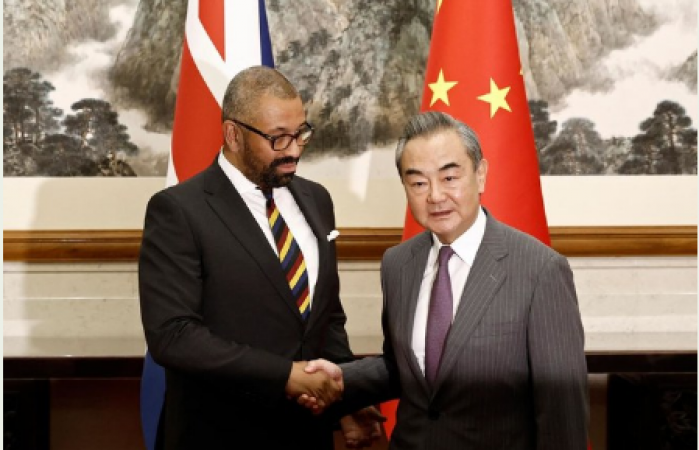
Beijing: In a diplomatic move laden with significance, UK Foreign Secretary Liz Truss unflinchingly raised crucial human rights concerns during her visit to China on Thursday.
Stepping into the heart of contentious issues, Truss tackled the treatment of Uyghur Muslims in Xinjiang and the erosion of democratic freedoms in Hong Kong, cementing the UK's commitment to advocating for human rights on the global stage.
Truss's meeting with Chinese Foreign Minister Wang Yi in Tianjin underscored the UK's resolute stance on human rights issues. Not shying away from expressing her concerns, Truss conveyed the UK's deep-seated worry about the prevailing human rights climate in China.
A particular focus was placed on the alarming situation in Xinjiang, where Uyghur Muslims have faced grave human rights abuses. Truss boldly called for the release of political prisoners and an immediate halt to the abuses taking place in Xinjiang.
Wang Yi, in response, maintained that China is dedicated to upholding human rights and had achieved substantial progress in this realm. He contended that the UK was infringing upon China's internal affairs by raising such concerns, a sentiment echoed by many countries that view discussions on human rights as undue interference.
Amidst this tête-à-tête, Truss's assertive approach extended to the issue of Hong Kong, a territory whose autonomy has been rapidly eroded by a series of restrictive measures from the Chinese government.
Expressing deep disappointment, Truss highlighted the UK's strong dissatisfaction with Beijing's imposition of the national security law on the city. The Foreign Secretary fervently called for the repeal of the law and the restoration of Hong Kong's cherished autonomy.
Wang Yi, in a predictable yet opposing stance, justified the imposition of the national security law as a necessary measure to safeguard China's national security interests.
He remained adamant that the law would not compromise Hong Kong's "high degree of autonomy," a statement that contradicts the sentiments of many observers who view the legislation as a severe infringement on the city's freedoms.
Also Read: PM Modi Extends Greetings on World Sanskrit Day
Truss's meeting with Wang Yi stands as a watershed moment in UK-China relations, as it marks the first high-level contact between the two nations since the UK imposed sanctions on Chinese officials implicated in human rights abuses in Xinjiang.
These sanctions had cast a shadow over the bilateral relationship, intensifying the underlying tensions and provoking questions about the potential outcomes of Truss's diplomatic engagement.
It remains to be seen how fruitful Truss's efforts will be in eliciting tangible change in China's human rights practices. The strained backdrop of UK-China relations, coupled with China's recurrent defensive stance on human rights discussions, poses a complex challenge to Truss's aims.
However, her readiness to address these issues head-on sends a clear signal that the UK is resolute in its commitment to championing human rights, even when confronting powerful counterparts.
Truss's assertive approach aligns with a broader global trend that sees countries increasingly willing to hold China accountable for its human rights record.
The international community's growing focus on China's actions reflects the recognition of its influence and the ethical imperative to address human rights violations, regardless of the political ramifications.
As the world watches closely, the outcome of Truss's diplomatic endeavor holds the potential to resonate beyond the UK-China relationship.
It may encourage other nations to adopt a more assertive stance in advocating for human rights and elevate the discourse surrounding the necessity of addressing such concerns on the global stage.
In conclusion, UK Foreign Secretary Liz Truss's fearless engagement with human rights concerns during her visit to China stands as a pivotal moment in international diplomacy. Her unflinching approach in raising these issues sends a resounding message about the UK's unwavering commitment to safeguarding human rights, even in the face of diplomatic complexities.
As China's global influence continues to grow, the discourse surrounding its human rights practices gains even greater significance. Truss's endeavor, while challenged by political nuances, serves as an important step towards promoting the values of human rights on a global scale, setting a precedent for other nations to follow suit.
Also Read: North Korea's Missile Launch Amidst US-South Korea Drills Fuels Escalating Tensions
The world awaits with bated breath as the aftermath of this audacious move unfolds, holding the potential to reshape international diplomacy and the discourse surrounding human rights advocacy.